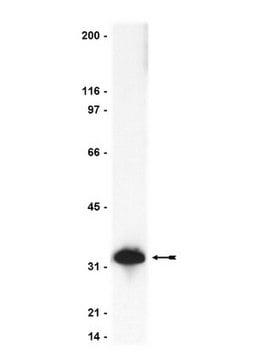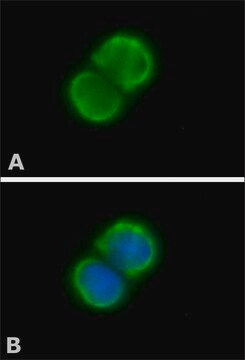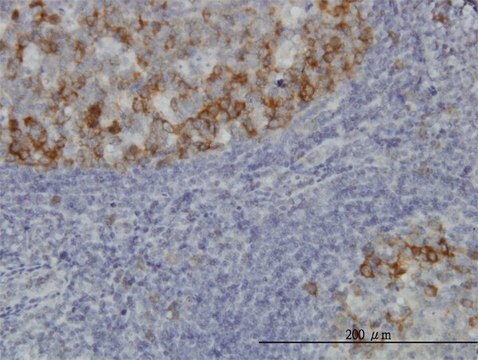MAB3610
Anti-Bub1 Antibody, clone 14H5
clone 14H5, Chemicon®, from mouse
About This Item
Produits recommandés
Source biologique
mouse
Niveau de qualité
Forme d'anticorps
purified immunoglobulin
Type de produit anticorps
primary antibodies
Clone
14H5, monoclonal
Espèces réactives
primate, human
Fabricant/nom de marque
Chemicon®
Technique(s)
immunocytochemistry: suitable
immunoprecipitation (IP): suitable
western blot: suitable
Isotype
IgG1
Numéro d'accès NCBI
Numéro d'accès UniProt
Conditions d'expédition
wet ice
Modification post-traductionnelle de la cible
unmodified
Informations sur le gène
human ... BUB1(699)
Description générale
Spécificité
Immunogène
Application
Epigenetics & Nuclear Function
Cell Cycle, DNA Replication & Repair
Immunocytochemistry: 1 μg/mL on tissue culture cells. Suggested fix is 3.5% PBS-buffered paraformaldehyde for 7 minutes. Permeabilization method is 0.2% Triton-X-100 after fixation. Suggested blocking buffer is 10 mM Tris, pH 7.5 with 150 mM NaCl with 0.1% BSA.
Immunoprecipitation: 1 μg/mL. Preferred cell lysis buffer is RIPA. Final reaction volume is 200 μL with a final protein concentration in the reaction mix of 1 mg/mL. Suggested capture agent is Protein G.
Optimal working dilutions must be determined by the end user.
Forme physique
Stockage et stabilité
Autres remarques
Informations légales
Clause de non-responsabilité
Vous ne trouvez pas le bon produit ?
Essayez notre Outil de sélection de produits.
Code de la classe de stockage
10 - Combustible liquids
Classe de danger pour l'eau (WGK)
WGK 2
Point d'éclair (°F)
Not applicable
Point d'éclair (°C)
Not applicable
Certificats d'analyse (COA)
Recherchez un Certificats d'analyse (COA) en saisissant le numéro de lot du produit. Les numéros de lot figurent sur l'étiquette du produit après les mots "Lot" ou "Batch".
Déjà en possession de ce produit ?
Retrouvez la documentation relative aux produits que vous avez récemment achetés dans la Bibliothèque de documents.
Notre équipe de scientifiques dispose d'une expérience dans tous les secteurs de la recherche, notamment en sciences de la vie, science des matériaux, synthèse chimique, chromatographie, analyse et dans de nombreux autres domaines..
Contacter notre Service technique







